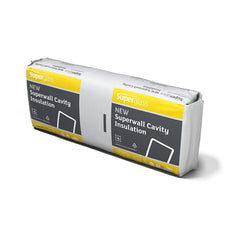
Choosing the right material for insulating your property is essential to creating a comfortable space. Glass wool and mineral wool are two of the most popular types of insulation, and to make it easier for you to choose between the two, we’ve put them head-to-head.
Read on to discover the basics of each material and which material is more effective for R-value, cost, moisture and fire resistance, sustainability, sound insulation and ease of installation. Let us help you decide which is better: glass wool or mineral wool.
Glass Wool and Mineral Wool: What’s the difference?
Also known as fibreglass, glass wool is made up of very tiny glass fibres. It is made when glass is heated to very high temperatures until it melts and is then spun to create fibres. These fibres bound together and create air pockets. Due to air being a poor conductor of heat, the warm air gets trapped inside these air pockets and warms the surrounding areas.
Also known as stone wool or rock wool, mineral wool is made up of raw materials. These raw materials are heated to very high temperatures until they melt and are then spun to create fibres, similar to the way glass wool is made.
R-Value: Which is better?
Glass wool and mineral wool have very similar R-values, around 3.30 or 3.40 per inch of thickness. This means they have more or less the same efficiency at conducting heat.
Cost: Which is cheaper?
Glass wool is the most cost-effective choice, being around 10% cheaper than mineral wool and just as effective at regulating temperature in your space.
Moisture and fire resistance: Which is more efficient?
When it comes to resisting moisture, mineral wool comes out on top. The material has water-resistant properties and is therefore not affected by damp or humid conditions. This also means you won’t have to worry about any mould developing. Glass wool, however, does not possess these same water-resistant properties and can get wet, making it susceptible to mould and rot.
Sustainability: Which is more eco-friendly?
As glass wool is made up of up to 86% recycled materials, it is generally considered much more eco-friendly and environmentally focused than mineral wool, which is made up of up to 70% recycled materials. Both options have a fairly high degree of sustainability, but if you’re looking for the most sustainable option, glass wool is the material for you.
Sound insulation: Which is best?
Mineral wool is much denser than glass wool, so it is much better at preventing sound from travelling through the insulation.
Ease of installation: Which is easiest?
Mineral wool is considered the easiest insulation to install, especially if you’re doing it yourself. It is easier to cut into the right size and move into the right place than glass wool, as glass wool is much limper.
Still unsure which insulation material to choose? Get in touch with our team today for expert advice.
DISCLAIMER: The contents of this guide are intended for information purposes only. Insulation king shall not be liable, answerable or accountable for any loss or damage resulting from the advice given
